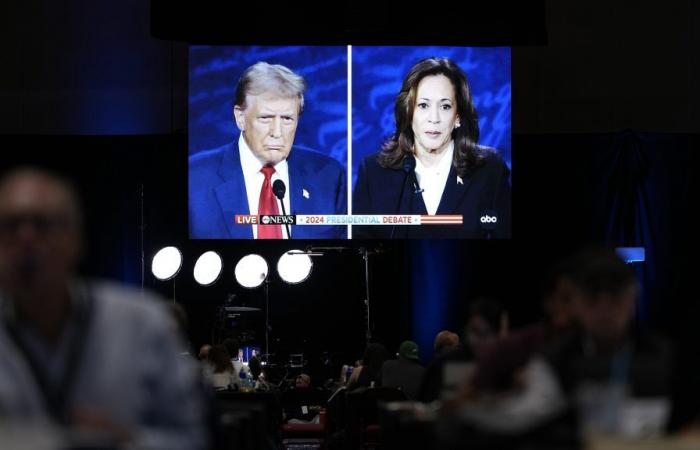This article was translated from content from CTV News.
In their quest for the White House, Republican candidate Donald Trump has promised to deport millions of undocumented migrants, while Democrat Kamala Harris has toughened her stance on illegal border crossings and asylum seekers.
“If Mr. Trump were elected and carried out mass deportations, a lot of these people would be seeking asylum in Canada, and so I suspect people in Ottawa would be talking about that,” said Donald Abelson, a science professor. politics at Western University, to CTV News. “With Harris, that’s probably less the case, largely because her policies would be less draconian, which doesn’t mean she’ll be easy when it comes to border issues.”
Here’s how the Canada-US border could be affected depending on whether Mr. Trump or Ms. Harris is elected US president.
Trump promises mass deportations
After Trump was inaugurated as president of the United States in January 2017, Canada quickly saw an increase in irregular border crossings and asylum requests.
Under threat of deportation by the Trump administration, it appears that thousands of undocumented immigrants and former temporary residents of the United States have preferred to try their luck by entering Canada on foot.
According to Immigration, Refugees and Citizenship Canada, irregular arrivals exploded from 2,434 in 2016 to 20,593 in 2017, while asylum applications more than doubled from 23,860 to 50,375 during the same period. .
The majority of them arrived by land in Quebec, putting obscure and unofficial border crossings such as Roxham Road in the national spotlight.
Irregular border crossings reached a new high in 2022 under President Joe Biden, just before Canada and the United States change the rules of the Safe Third Country Agreement in March 2023 to limit requests for border crossings. asylum at official border crossings.
Although asylum applications remain numerous in Canada, the number of irregular crossings has since decreased.
During his election campaign, Donald Trump promised a new wave of mass expulsions by invoking war powers, using the army and relying on the governors of allied states.
“You know, we’ve had to deal with this situation before,” Professor Abelson, an expert on American politics and foreign policy, commented on Mr. Trump’s latest expulsion threat. . “It’s entirely possible that we need to prepare for it.”
Millions of people could be targeted, but it remains to be seen whether a measure of this magnitude is even feasible or whether it is destined to remain stalled, like Mr. Trump’s previously proposed border wall.
It is estimated that more than 11 million undocumented immigrants reside in the United States.
“What Trump appears to be considering is potentially legal.”
– Joseph Nunn, advisor to the Brennan Center for Justice at New York University School of Law
SEE ALSO | Trump falsely accuses Ohio immigrants of kidnapping and eating pets
“It’s going to be extraordinarily complicated and logistically difficult… but it’s possible, and so it has to be taken seriously,” Nunn said in an interview with The Associated Press.
During Mr. Trump’s first term, annual deportations never exceeded 350,000, far below the record of 432,000 deportations set by former President Barack Obama in 2013.
However, unlike Mr. Obama, Mr. Trump has long targeted undocumented immigrants to rally his base.
“As soon as I am sworn in, we will launch the largest deportation operation in the history of our country,” he said at a campaign event in Michigan last July.
The following month, in Montana, he promised to “seal the border, stop the invasion, and send illegal aliens home where they belong.”
Al Parsai, a Toronto-based immigration consultant, believes tighter border controls under Trump could slow the flow of people and goods between the United States and Canada.
An estimated 400,000 people cross the border between the two countries every day for work, tourism, shopping and more
“Trump’s approach could lead to tougher border controls and potentially longer wait times for Canadians and Americans crossing the border,” Parsai told CTV News. “Its emphasis on security could lead to additional requirements or stricter inspections for travelers, complicating the border crossing experience. This could frustrate frequent cross-border travelers, especially if security measures become too restrictive.”
Harris toughens his stance on borders
During her election campaign, Ms. Harris recently tried to take a tougher stance on immigration, but one that could still appeal to liberal voters.
“I reject the false choice that suggests we must choose between securing our border and creating a safe, orderly and humane immigration system,” Harris said in a September 27 speech in Arizona. , a border region with Mexico “We can and we must do both.”
Because of their close ties to Canada, Harris and her vice-presidential running mate are generally seen as easier partners for Ottawa. Ms. Harris spent her formative years in Montrealwhere she graduated from high school.
Minnesota Governor Tim Walz, whose state shares an 885 km border with Ontario and Manitoba, has long promoted personal, cultural and economic relations between the neighboring countries.
“I think Ms. Harris, who knows Canada well and has lived there, would have a much easier relationship with her and her running mate, Mr. Walz, than with Mr. Trump and Mr. Vance,” Mr. Abelson said . “There’s no doubt about it.”
However, Ms. Harris is known for changing her position.
She previously opposed Obama-era deportations and supported calls to treat illegal border crossings as civil offenses rather than criminals.
As a presidential candidate, Harris toughened her image by promising to strengthen border security and crack down on illegal immigration.
“The United States is a sovereign nation and I believe it is our duty to establish and enforce rules at our border, and I take that responsibility very seriously,” Harris said in Arizona. “Those who cross our borders illegally will be apprehended, deported and barred from entry for five years… And if someone does not apply for asylum at a legal port of entry and crosses our border illegally, they will not will not be able to benefit from asylum.”
According to Mr. Abelson, the tone adopted by Ms. Harris during her campaign could change if she wins the presidency.
“Certainly the Harris camp is pivoting a little bit, certainly becoming a little more conservative, because undecided voters seem to fear that she’s not going to be tough enough or that she’s not going to be able to protect American interests as well as Trump,” believes Mr. Abelson. “But as you know, there is a huge difference between campaigning and governing and at this point, of course, his number one priority is getting elected. Once she is elected, the rhetoric of someone like Harris will be toned down. This is not the case for Trump.”
Will Americans go north if Trump wins?
Almost every American election makes headlines, and often Americans threaten to move to Canada if their preferred candidate loses.
What is it really?
U.S. citizens generally make up a small but consistent share of new permanent residents in Canada, just under 3% since 2015. While interest may increase around elections, experts say that rarely translates into d substantial immigration.
“Since Trump, we are seeing a lot more would-be immigrants who want to leave the United States for a more liberal Canada,” Jacqueline Bart, an immigration lawyer based in Toronto, previously noted to CTV News. “Most Americans looking to move to Canada are middle-aged, liberal Americans. Given their age, it is difficult to immigrate unless you have a full-time job in Canada or start a business there.”
With information from The Canadian Press and The Associated Press.






